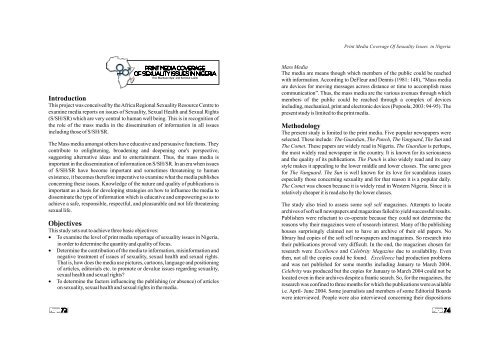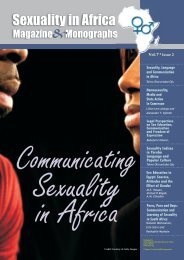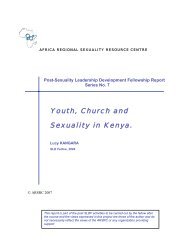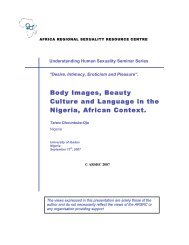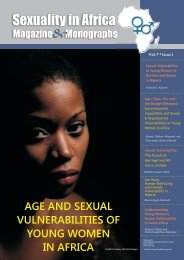Sexuality in Media: Emerging Issues in Africa - Africa Regional ...
Sexuality in Media: Emerging Issues in Africa - Africa Regional ...
Sexuality in Media: Emerging Issues in Africa - Africa Regional ...
You also want an ePaper? Increase the reach of your titles
YUMPU automatically turns print PDFs into web optimized ePapers that Google loves.
Introduction<br />
This project was conceived by the <strong>Africa</strong> <strong>Regional</strong> <strong>Sexuality</strong> Resource Centre to<br />
exam<strong>in</strong>e media reports on issues of <strong>Sexuality</strong>, Sexual Health and Sexual Rights<br />
(S/SH/SR) which are very central to human well be<strong>in</strong>g. This is <strong>in</strong> recognition of<br />
the role of the mass media <strong>in</strong> the dissem<strong>in</strong>ation of <strong>in</strong>formation <strong>in</strong> all issues<br />
<strong>in</strong>clud<strong>in</strong>g those of S/SH/SR.<br />
The Mass media amongst others have educative and persuasive functions. They<br />
contribute to enlighten<strong>in</strong>g, broaden<strong>in</strong>g and deepen<strong>in</strong>g one's perspective,<br />
suggest<strong>in</strong>g alternative ideas and to enterta<strong>in</strong>ment. Thus, the mass media is<br />
important <strong>in</strong> the dissem<strong>in</strong>ation of <strong>in</strong>formation on S/SH/SR. In an era when issues<br />
of S/SH/SR have become important and sometimes threaten<strong>in</strong>g to human<br />
existence, it becomes therefore imperative to exam<strong>in</strong>e what the media publishes<br />
concern<strong>in</strong>g these issues. Knowledge of the nature and quality of publications is<br />
important as a basis for develop<strong>in</strong>g strategies on how to <strong>in</strong>fluence the media to<br />
dissem<strong>in</strong>ate the type of <strong>in</strong>formation which is educative and empower<strong>in</strong>g so as to<br />
achieve a safe, responsible, respectful, and pleasurable and not life threaten<strong>in</strong>g<br />
sexual life.<br />
Objectives<br />
This study sets out to achieve three basic objectives:<br />
• To exam<strong>in</strong>e the level of pr<strong>in</strong>t media reportage of sexuality issues <strong>in</strong> Nigeria,<br />
<strong>in</strong> order to determ<strong>in</strong>e the quantity and quality of focus.<br />
• Determ<strong>in</strong>e the contribution of the media to <strong>in</strong>formation, mis<strong>in</strong>formation and<br />
negative treatment of issues of sexuality, sexual health and sexual rights.<br />
That is, how does the media use pictures, cartoons, language and position<strong>in</strong>g<br />
of articles, editorials etc. to promote or devalue issues regard<strong>in</strong>g sexuality,<br />
sexual health and sexual rights?<br />
• To determ<strong>in</strong>e the factors <strong>in</strong>fluenc<strong>in</strong>g the publish<strong>in</strong>g (or absence) of articles<br />
on sexuality, sexual health and sexual rights <strong>in</strong> the media.<br />
Pr<strong>in</strong>t <strong>Media</strong> Coverage Of <strong>Sexuality</strong> <strong>Issues</strong> <strong>in</strong> Nigeria<br />
Mass <strong>Media</strong><br />
The media are means though which members of the public could be reached<br />
with <strong>in</strong>formation. Accord<strong>in</strong>g to DeFleur and Dennis (1981: 148), “Mass media<br />
are devices for mov<strong>in</strong>g messages across distance or time to accomplish mass<br />
communication”. Thus, the mass media are the various avenues through which<br />
members of the public could be reached through a complex of devices<br />
<strong>in</strong>clud<strong>in</strong>g, mechanical, pr<strong>in</strong>t and electronic devices (Popoola, 2003: 94-95). The<br />
present study is limited to the pr<strong>in</strong>t media.<br />
Methodology<br />
The present study is limited to the pr<strong>in</strong>t media. Five popular newspapers were<br />
selected. These <strong>in</strong>clude: The Guardian, The Punch, The Vanguard, The Sun and<br />
The Comet. These papers are widely read <strong>in</strong> Nigeria. The Guardian is perhaps,<br />
the most widely read newspaper <strong>in</strong> the country. It is known for its seriousness<br />
and the quality of its publications. The Punch is also widely read and its easy<br />
style makes it appeal<strong>in</strong>g to the lower middle and lower classes. The same goes<br />
for The Vanguard. The Sun is well known for its love for scandalous issues<br />
especially those concern<strong>in</strong>g sexuality and for that reason it is a popular daily.<br />
The Comet was chosen because it is widely read <strong>in</strong> Western Nigeria. S<strong>in</strong>ce it is<br />
relatively cheaper it is read also by the lower classes.<br />
The study also tried to assess some soft sell magaz<strong>in</strong>es. Attempts to locate<br />
archives of soft sell newspapers and magaz<strong>in</strong>es failed to yield successful results.<br />
Publishers were reluctant to co-operate because they could not determ<strong>in</strong>e the<br />
reasons why their magaz<strong>in</strong>es were of research <strong>in</strong>terest. Many of the publish<strong>in</strong>g<br />
houses surpris<strong>in</strong>gly claimed not to have an archive of their old papers. No<br />
library had copies of the soft sell newspapers and magaz<strong>in</strong>es. So research <strong>in</strong>to<br />
their publications proved very difficult. In the end, the magaz<strong>in</strong>es chosen for<br />
research were Excellence and Celebrity Magaz<strong>in</strong>e due to availability. Even<br />
then, not all the copies could be found. Excellence had production problems<br />
and was not published for some months <strong>in</strong>clud<strong>in</strong>g January to March 2004.<br />
Celebrity was produced but the copies for January to March 2004 could not be<br />
located even <strong>in</strong> their archives despite a frantic search. So, for the magaz<strong>in</strong>es, the<br />
research was conf<strong>in</strong>ed to three months for which the publications were available<br />
i.e. April- June 2004. Some journalists and members of some Editorial Boards<br />
were <strong>in</strong>terviewed. People were also <strong>in</strong>terviewed concern<strong>in</strong>g their dispositions


